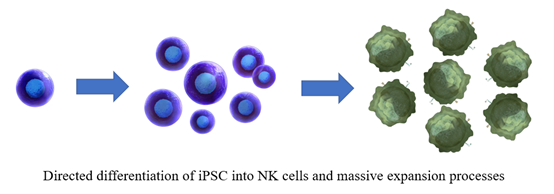

Research & Development
iPSC
Induced pluripotent stem cells (iPSCs) are generated by artificially inducing the expression of a specific set of genes in adult cells. Like natural pluripotent stem cells, iPSCs have the potential to differentiate into various cell types. This technology was first invented in 2006 when iPSCs were obtained from mouse cells. Human iPSCs were generated in 2007, and the related research won the Nobel Prize in Physiology and Medicine in 2012. Using iPSCs as the starting material has the potential to solve current problem in producing large quantities of homogeneous cell products from limited source cell material.

Why iPSC-CAR-NK Cells?
There are various sources of NK, including primary cells from PBMC and Cord Blood, NK-92 cell line or hematopoietic stem and progenitor cells.
We prefer the induced pluripotent stem cell(iPSC) approach, because it has:
l Self-replicating and differentiation potential to all types of functional cells including NK as an renewable and clonal cell bank for scalable production
l Properties allowing precise gene editing and CAR addition in homogeneous population and validation, to overcome disadvantages of low efficiency and precision issues in primary cells or regulatory concerns if using tumor cell lines
l Existing early clinical results supporting safety and efficacy of iPSC-CAR-NK
The advantage of iPSC-CAR-NK technology
Generating iPSCs by footprint-free reprogramming techniques can avoid the risk of residual reprogramming vectors and integration of foreign gene fragments into iPSC genome.
Gene editing technology in the generation of iPSC-CAR cells:
l Non-viral techniques are used to edit iPSCs to achieve improved NK differentiation. Precise editing can be achieved by thoroughly designed integration sites and gene editing elements. Clonality of iPSC-CAR cells with desired edits is validated by sequencing.
l Compared with CAR-T or CAR-NK cells constructed by viral vectors, generating iPSC-CAR cells through gene editing technologies can overcome the packaging limit of viral vectors and integrate multiple functional genetic engineering components in one gene editing element to accomplish more complex genetic engineering outcomes, such as improved functionality of final iPSC-CAR-NK products. For example, gene editing can be applied to achieve better differentiation, expansion, and killing, improve resistance to the oppressive immune microenvironment and migration, which will process the application of iPSC-CAR-NK therapy in treatment of solid tumors.
l Due to their unlimited proliferation, edited iPSCs can be cloned and banked, overcoming the challenging of low editing efficiency.
l iPSC banks meeting the tertiary cell bank management requirement by the pharmaceutical industry are established under GMP conditions.
Unique advantages of Neukio’s iPSC-CAR-NK production process:
l Feeder-free process eliminates the introduction of exogenous bioactive substances for better quality control and risk reduction
l The use of closed and automated systems reduces human errors and operating costs
l The iPSC to NK cell differentiation and expansion process occurs in an 100% closed condition. Bioreactors are used to culture embryoid bodies (EBs) for feeder-free differentiation and expansion.
l Our process assures high purity, high yield, and low impurities in the final products, significantly reducing production cost








